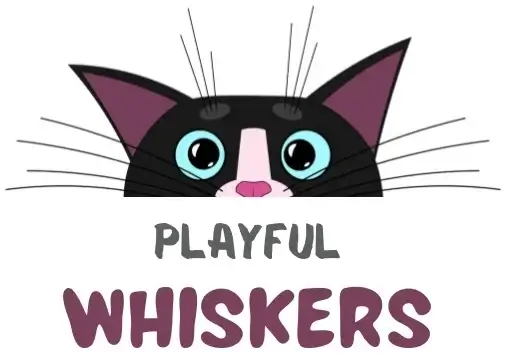Why Is My Cat Always Hungry? 7 Surprising Reasons
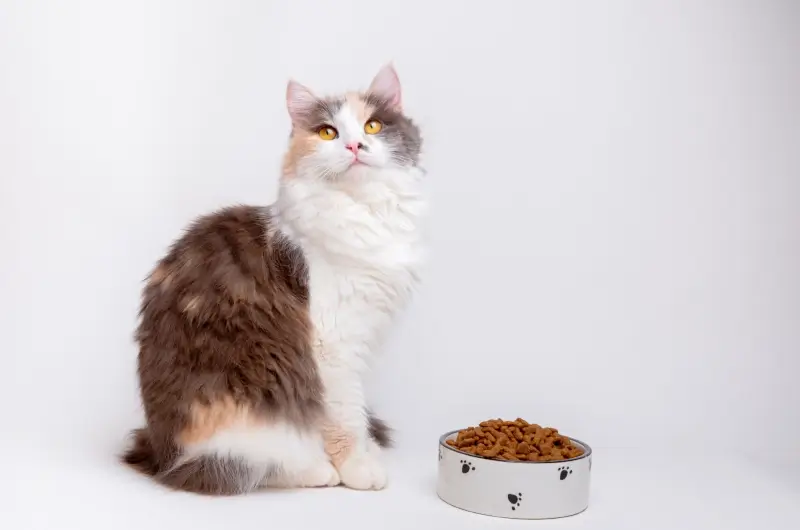
Ever noticed how your cat can polish off their breakfast and still look at you with those big, pleading eyes as if they haven’t eaten in days?
It’s a behavior that leaves many cat parents scratching their heads and reaching for the food bowl – but wait! Your feline friend’s seemingly bottomless appetite might not be what it seems.
Before you fill that food bowl again, let’s uncover the fascinating truth behind your cat’s constant hunger. From clever manipulation tactics to potential health concerns, understanding why your cat always seems ready for their next meal can help you make better decisions about their feeding routine and overall wellbeing.
Why Your Cat Seems Hungry All the Time
Food isn’t just about filling your cat’s belly – it affects everything from their immune system to their energy levels. But here’s something many cat parents get wrong: letting kitty eat whenever they want isn’t always the best approach!

Think your cat can control their own portions? While some cats might be good at self-regulating, others will happily munch their way through an entire bowl (and then some). This can lead to weight gain, especially if you’re leaving food out all day or serving lower-quality meals.
When your furry friend meows for food, they might not actually be hungry at all. Cats are clever little creatures who sometimes beg for food because they’re bored, want attention, or even have an increased appetite.
Understanding what your cat’s food-seeking behavior really means can make all the difference in keeping them healthy and happy.
Just like us, cats need the right amount of food at the right times. Getting portion sizes and meal timing right helps maintain their ideal weight and keeps them feeling their best.
Health-Related Causes of Your Cat’s Big Appetite
When your cat seems like a bottomless pit, health issues might be the culprit. Hyperthyroidism makes cats extra hungry while dropping pounds – watch for restlessness and changes in their fur.
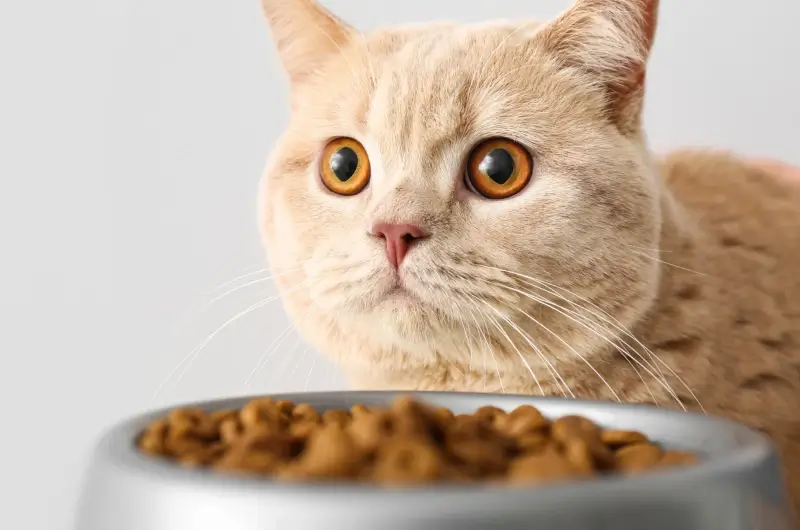
If your kitty’s drinking more water and visiting the litter box frequently while maintaining a hefty appetite, diabetes could be the reason.
Those pesky intestinal worms can make your cat eat more without gaining weight, often leaving them with a shabby coat. Some cats eat loads due to inflammatory bowel problems or trouble absorbing nutrients properly – you might notice they’re losing weight despite eating like a champ.
If your cat’s taking steroids or certain seizure medications, these might make them extra snacky. And don’t forget about special times like pregnancy – expecting mama cats need more food to keep up with their growing family!
Getting older can change how cats process food, and sometimes serious conditions like cancer can make them eat more. If you notice sudden changes in your cat’s appetite, a quick trip to the vet can help figure out what’s going on.
Is Your Cat’s Diet Meeting Their Needs?
Sometimes your cat’s endless appetite comes down to simple math – they might not be getting enough calories! While your kitty might act hungry all the time, they could actually need more food, especially if they’re still growing or super active.

The quality of food matters too. Low-grade cat food often lacks the protein and nutrients your feline friend needs, making them feel hungry even after eating. Think of it like filling up on junk food – it might fill the stomach temporarily, but it won’t keep you satisfied for long.
Timing is everything when it comes to feeding your cat. Instead of one big meal, try spreading smaller portions throughout the day. This matches how cats naturally eat in the wild and helps prevent those midnight food raids!
Temperature plays a part too – cats burn more calories staying warm in cold weather. And some cats, just like people, naturally have bigger appetites than others. The key is knowing your individual cat’s needs and adjusting their portions accordingly.
Remember that kittens and active cats need more fuel for their busy lifestyles, so don’t be surprised if they seem extra hungry during growth spurts or after playtime!
When Your Cat’s Not Really Hungry: Understanding Behavioral Factors
Sometimes your cat’s begging for food has nothing to do with an empty stomach! Bored cats often turn to food for entertainment, just like we might raid the fridge when there’s nothing else to do.
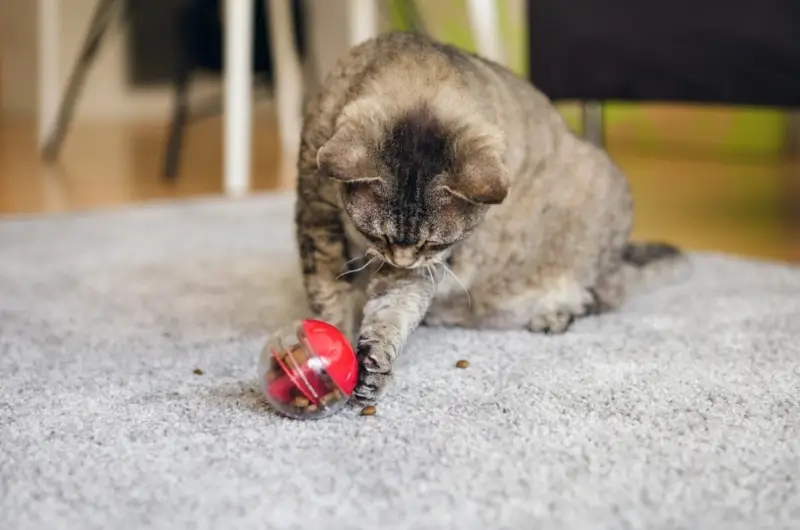
Adding fun toys, climbing spaces, and play sessions can stop this snack-seeking behavior.
Big changes at home – like a new pet or moving house – can make cats eat more. It’s their way of dealing with stress, similar to how some people comfort eat.
Speaking of habits, if you give your cat treats or attention when they meow for food, you teach them that begging works!
Want to know a secret? Your cat might just want some quality time with you. Those food-related meows could really mean “pay attention to me!” Instead of filling the food bowl, try a play session or some gentle pets.
Make meals more exciting by using puzzle feeders or hiding small portions around the house. This lets your cat “hunt” for their food, keeping their mind busy and their tummy satisfied. It’s closer to how they’d eat in nature, and it’s way more fun than just munching from a bowl!
How to Spot Why Your Cat’s Always Hungry
Keeping tabs on your cat’s eating habits can tell you a lot about their health. Watch for changes in how much they eat, whether they’re gaining or losing weight, and if their grooming routine has changed.
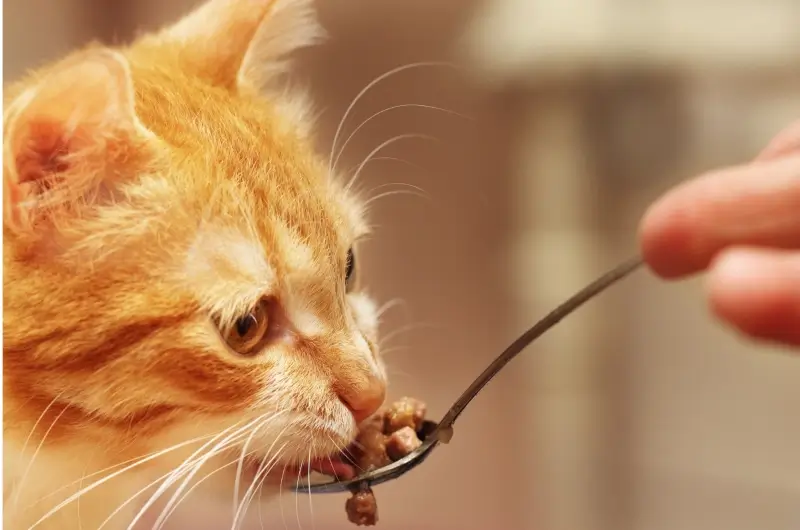
A cat who suddenly starts wolfing down food might be telling you something’s up!
Pay attention to other signs that often come along with an extra-hungry kitty. Throwing up and increased thirst, runny stools, drinking lots of water, or peeing more than usual could point to health problems that need checking out. These clues help your vet figure out what’s making your furry friend so hungry.
Start writing down when your cat asks for food and how they act around mealtime. Do they circle their bowl constantly? Meow non-stop at specific times?
Maybe they’re perfectly fine until they hear the treat bag rustle? These patterns can reveal whether your cat’s hunger is about food or something else entirely. A food diary noting these behaviors gives you and your vet valuable information to work with.
When to Consult a Veterinarian
Some changes in your cat’s eating habits need quick attention from the vet. Keep an eye out if your kitty suddenly gains or loses weight, especially if they’re eating more than usual.

Throwing up and increased thirst, runny stools, or drinking and peeing more than normal are red flags that something’s not right.
Watch how your cat acts around food too. If they start getting aggressive at mealtimes or seem obsessed with eating, it’s time for a check-up. Even subtle changes matter – like a usually picky eater suddenly gobbling everything in sight.
Getting to the vet early can make a big difference in your cat’s health. Many conditions that cause extra hunger, like diabetes or thyroid problems, are easier to handle when caught early. Plus, quick action often means simpler treatments and better outcomes for your furry friend.
Remember, you know your cat best. If something about their eating habits feels off, trust your gut and call the vet. Better to check and find nothing wrong than to wait until a small problem becomes a bigger one!
Smart Ways to Handle Your Cat’s Big Appetite
Got a kitty who always seems ready for dinner? Start with high-quality cat food that matches their age and health needs. Just like you wouldn’t feed a baby adult food, your cat needs the right nutrition for their life stage.

Set up regular mealtimes instead of leaving food out all day. Think of it as your cat’s personal dining schedule – they’ll learn when to expect their meals and stop pestering you between times. Split their daily portion into 3-4 smaller meals to match how cats naturally eat.
Make mealtime fun with food puzzles! Hide kibble in toys or special feeders that make your cat shows hunger signs work for their food. It’s like turning dinner into a game while slowing down those speed-eaters.
Free-feeding (leaving food out all day) might seem easy, but it can lead to weight gain and make it hard to spot changes in appetite. Keep your cat healthy with regular vet check-ups and deworming – these simple steps prevent many common hunger-causing issues.
Always follow your vet’s advice about portions and feeding times, especially if your cat has health concerns. They know what’s best for your particular pet!
Making Peace with Your Cat’s Appetite
Understanding why your cat always seems hungry is the first step toward creating a healthier relationship with food. Whether it’s medical issues, behavioral patterns, or simply a need for attention, identifying the root cause helps you respond appropriately instead of just reaching for the food bowl.
Remember, a hungry-seeming cat isn’t always a hungry cat. By maintaining regular vet check-ups, establishing consistent feeding routines, and providing plenty of environmental enrichment, you can ensure your feline friend stays healthy and satisfied – even if they try to convince you otherwise!
